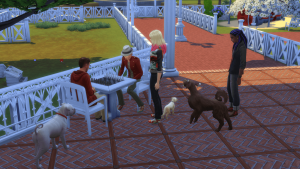As human beings, introverted or outgoing, we are meant to connect. As children, we naturally make friends with classmates and playmates. And when we get our first jobs, we make friends with coworkers. There are many reasons why, later in life, we may find it difficult to make friends. Perhaps we’ve moved a lot, or recently gone through a breakup, or now our work situation hinders coworker friendships. Here are some tips I learned through my journey.
Get Out and Do Stuff
 Making new friends is similar to dating. You must leave your house and put yourself in places where other people go. Think of something you like to do, or something you want to do, and then sign up for lessons or join a club or put yourself in places where the same people frequent.
Making new friends is similar to dating. You must leave your house and put yourself in places where other people go. Think of something you like to do, or something you want to do, and then sign up for lessons or join a club or put yourself in places where the same people frequent.
I met my current best friend at a gym. I met another good friend at a wine tasting event. I know others who have made friends by going regularly to a local pub. There actually are places like Cheers where regulars get to know each other.
If you’re an introvert like me, your inclination will be to stay home after work. But think of yourself as a corporation, and you are the Manager of You Corp. What would you make yourself do, as the boss, in the best interest of You Corp?
Push Past Your Inhibitions
You must go outside your comfort zone.
- Initiate conversations
- Offer to help
- Give out your contact information, or get someone else’s
These things may cause anxiety before doing them, but just do them. If you get rejected, don’t worry about it. You may meet 200 people before finding that one person who you really connect with. To make it easier to give out your contact information, consider getting business cards. In many situations, you will be hesitant to give out a card, but tromp through that fear and do it. Don’t concern yourself with what anybody else might think. Finding that “bestie” is worth it.
If you don’t know what to talk about, start by asking a question. Take note of something, and ask about it. You may be surprised at where the conversation can go from there. You also may want to keep up to date with news in order to find things to talk about. I like to glance through Legible News because it’s a succinct website that has no ads, pictures, or pop-ups.
Learn from The Sims
 In the video game, The Sims, you create people, and you control them through a simulated life. When your sim moves into its new house, eventually it meets people. They start chatting. There is a meter indicating the strength of the friendship. If your sim doesn’t talk to the person much, the friendship withers. Even by calling the acquaintance on the phone, the relationship strengthens. When your sim doesn’t have enough social interaction in its life, it gets sad. Learn from The Sims. When you do meet someone who you connect with, call them. Even better, meet with them now and then. Make time for your new, potential friend. You must put time into talking with someone in order for a friendship to grow.
In the video game, The Sims, you create people, and you control them through a simulated life. When your sim moves into its new house, eventually it meets people. They start chatting. There is a meter indicating the strength of the friendship. If your sim doesn’t talk to the person much, the friendship withers. Even by calling the acquaintance on the phone, the relationship strengthens. When your sim doesn’t have enough social interaction in its life, it gets sad. Learn from The Sims. When you do meet someone who you connect with, call them. Even better, meet with them now and then. Make time for your new, potential friend. You must put time into talking with someone in order for a friendship to grow.
Be the Welcome Wagon
People who are new to town have a high friend potential. As adults, a lot of people we meet will have a full, busy life, and they won’t be motivated to develop a new friendship. People who are new to town are more likely to have a friend craving.
Take note of houses for sale in your neighborhood, or moving trucks at your condo, etc. Actively look for newbs. When you see one you like, make a gluten-free banana loaf and bring it over. Introduce yourself and tell them how you were new to the neighborhood once. Give them a list of suggestions – stores nearby you like, restaurants, the better gas stations, the library, etc.
Don’t wait for neighbors to come to you. When I was new to my neighborhood, I made ten dozen chocolate chip cookies, and I took plates around to my neighbors’ houses and introduced myself. I’m an introvert, so this was out of my comfort zone. You don’t have to be new to town to do this.
Don’t Throw Pearls at Swine
You’ll know pretty quickly if the people you meet are worth investing your time into. If they aren’t, don’t waste your energy. Keep looking until you find someone worthy of your friendship, and then give them your time and care.
You’re not looking for perfection, though. Everybody will annoy you in some way at some point. Exercise forgiveness, tolerance, and understanding. Just don’t expend energy on people who either don’t carve out time for you, or aren’t the type of person you want in your life.
Care
 Actually care. Ask people about their lives. Ingest what they are saying. Put yourself in their shoes. Feel what they are feeling. Care. Don’t just ask them questions selfishly to prove that you are reciprocating in conversation, actually care. If this doesn’t come naturally to you, force yourself to care. Really think about what the person is saying, think about their life, and imagine that the things they are saying are happening to you.
Actually care. Ask people about their lives. Ingest what they are saying. Put yourself in their shoes. Feel what they are feeling. Care. Don’t just ask them questions selfishly to prove that you are reciprocating in conversation, actually care. If this doesn’t come naturally to you, force yourself to care. Really think about what the person is saying, think about their life, and imagine that the things they are saying are happening to you.
Good friendships take time. Don’t put pressure on yourself. Don’t worry about it. Just do the things above, and, in time, your friendship will grow.
